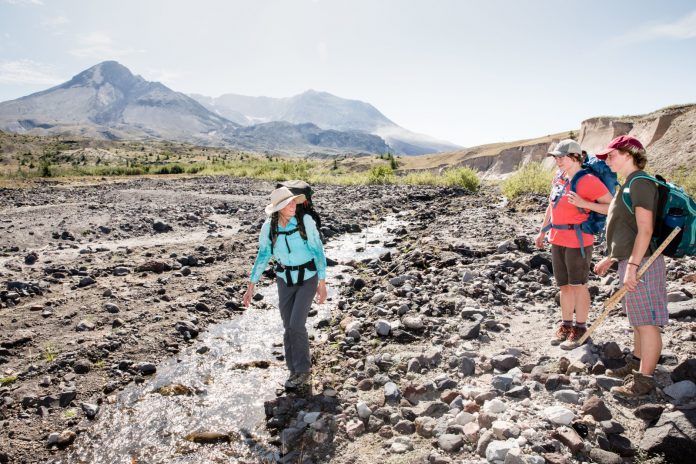
Submitted by The Evergreen State College
With ground-breaking research over two summers hiking through the blast zone of Mount St. Helens, a group of Evergreen students and faculty have discovered how plant sex is influencing that ecosystem’s recovery.
An article titled “Plant sex influences terrestrial-aquatic interactions” was recently published in the journal Ecosphere by Evergreen faculty member Carri J. LeRoy and four undergraduate students, along with collaborators from the U.S. Forest Service and the Science Museum of Minnesota.
The research, which was funded by the National Science Foundation, was conducted at Mount St. Helens National Volcanic Monument over the past two summers. It explores how streams in the region are recovering from the 1980 eruption.
The study shows that female willow trees grow closer to streams in the area, contributing organic matter to linked stream systems. In a carbon- and nutrient-limited environment like a post-eruption landscape, this could impact how the streams function in the ecosystem.
“The finding of significant differences between male and female plants on ecosystem function in Mount St. Helens opens up many questions regarding how sex differences influence overall ecosystem stability and function in other systems,” said Betsy von Holle, program director at the National Science Foundation.
LeRoy, who encourages students at Evergreen to pursue full-time research, has co-authored more than 15 peer-reviewed scientific articles with 30 undergraduate students. “It gives them opportunities to try out being a scientist as an undergraduate so they have confidence when they go to graduate school,” she said.
“When you’re blessed with the opportunity to do research alongside students, then it’s a win-win. We’re all making strides toward understanding the world,” she added.
Student co-authors of the study worked with LeRoy as fellows in Evergreen’s Summer Undergraduate Research Fellowship (SURF) program. The grant program helps undergraduates develop career and research skills by assisting faculty in their academic work outside the classroom.
















































